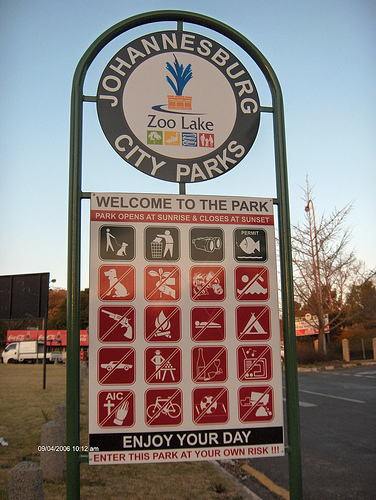Cry the beloved country!

I’m writing this as I leave South Africa – sitting in an airport lounge on WiFi (iPass via South Africa’s Internet Solutions) at the end of my fifth trip here over a span of six years. I’m a member of the President’s International Advisory Council (PIAC) on the Information Society, which had its meeting over the weekend, and I stayed on for two days for the tenth birthday meeting of its ISP association, ISPA, in Johannesburg.

I’m thinking back to what my fourth-grade teacher often told me: “I wouldn’t criticize you if you couldn’t do so much better!”
South Africa has had so much promise for so long… One reporter asked were we happy with the SA government’s directions and its willingness to take our advice… That’s not the problem; the problem is the speed with which teh advice is implemented – or not.
But first – if you’re my typical reader, rather than a South African sharing my frustration with the delays – why should you care? Because South Africa is the de facto first country of Africa, especially of sub-Saharan Africa. Like the US, it is not always loved, but it matters. Other African countries look to it for examples, to say nothing of skills and funding. If South Africa succeeds, the rest of Africa may follow. South Africa has the most developed economy, arguably the best government and the best leaders, a moral edge in its victory over apartheid…but all those edges are wearing thin as it fails to exploit its advantages.
But Internet service is expensive: about $120 US for a typical 512K residential account.Indeed, one of the big problems in South Africa is the high cost of telecommunications, both analogue and digital. There’s a shortage of international bandwidth to the rest of the world, a monopoly in domestic landline phone service, and high prices for mobile phones.
After many years, things are beginning to crack open: Last Thursday the SNO (second national operator), a company called Neotel, opened for business (conveniently timed for the PIAC meeting and fulfilling a recommendation from our first session in 2001, though we were hardly the first to suggest it). Neotel will offer phone service and also Internet service, competing with a host of domestic ISPs but also with SA Telkom,
Good investment...for whom?
which offers ADSL over its phone lines (and has about 60 percent market sharein broadband). More international capacity is coming online. And the decision has been taken to unbundled the local loop, though there need to be a few more meetings and a committee to figure out how to do so. VOIP has now been legal for almost two years, though of course you need access to bandwidth (and a PC or other device) to use it.
Making a noise
So this year I became a bit of a troublemaker. It’s no good to sit around complaining, for me or for the country. During the PIAC session (which I can’t report on per se, but I can talk about what I said), I asked whether there was a law against consumers sharing or reselling their bandwidth over a WiFi hotspot. The consensus was that this was – or at least should be – okay. And what about the Internet providers? Did their terms of service permit this? Again, a little confusion, but general agreement that this was or should be permitted. Of course, you might have to register…but that wasn’t to stop anyone; it’s merely a formality. One official mentioned that he had tried to do this but the provider objected, but that shouldn’t have happened.
I took the opening. At the press conference that followed our meeting, I purposely reported on this in public in an effort to make people aware that such a possibility exists and that they should go forth and do it..... By doing so with four neighbors, anyone could, in effect, reduce the cost by a factor of five.
A member of said public, Jarred Cinman (actually a software developer, at Cambrient), wasn’t that impressed, and wrote to me:
“You are quoted in this article as saying that "consumers needed to be entrepreneurial by buying and reselling broadband."
Is that really an accurate quote?
Could you please explain:
1) How this could possibly be legal? Don't you need a licence to "resell broadband"? Are you suggesting that every consumer apply for an ISP licence?
2) If you seriously believe this is the answer to driving down broadband costs in South Africa?”
Yes, I do, I replied. He pointed out that an Internet account is typically 512K, so a home network could get pretty congested. And a typical $120/month account is limited to 3 gigabytes a month.
True enough, but you can buy extra gigabytes for just about $10 per gigabyte. And if you charge – or “share costs” – on the basis of usage, you can even ease the congestion problem.
The point is that rather than quibble, people need to go out and do things, without always waiting for everything to be "ready." And rather than complain about the regulators, test the regulations! Don't ask for permission; if necessary, ask for forgiveness (or get enough people with you to challenge restrictions that may or may not exist).
This all caused quite a stir in the small community of people who care about such things… but I am trying to enlarge that community. This mid-day I got interviewed on a fairly broadly followed radio show and said the same thing.
This afternoon, at the ISPA conference, I ran into some of the entrepreneurs who are trying to encourage the same sort of action – but, not being “noted experts from abroad,” they have trouble gaining the visibility they deserve.
They include Johann Botha and Abraham van der Merwe, the two partners in Cape Town-based Amobia , who also run an ISP called Frogfoot. They offer tools for building WiFi networks and VPNs among other things…and of course what their users do with their capacity is up to them.
Then there’s Skyrove, which I heard from later, and whose cofounder, Henk Kleynhans, says, “Fon relies on lots of people having broadband access and then sharing it, while Skyrove encourages people to GET broadband SO they can share it and earn revenues. The main benefit about Fon is mobility…while [Skyrove’s] main benefit is actually cheaper internet access, regardless of mobility!”
He adds,“It's when people charge in time or share for free that people start abusing bandwidth. We have one hotspot running at 512K with 20 users, though most hotspots run at 1 Mbps
And then there’s David Jarvis of UniNet, who built a municipal wireless network for the town of Knysna, a tourist resort on the south coast of the country. Alan Levin comments:
Too much patience?
The African government has so much moral credibility from its successful struggle that the people tend to forgive it too readily. It’s time for them to complain. But how can they if they don’t know what’s possible. Now, perhaps, they will find out.
What’s really going on here is the more efficient use of the bandwidth that already exists. At one end, Telkom SA will at least be experiencing horizontal competition (even if it’s another giant, state-connected entity). At the other, it will now be facing competition from its customers in selling its capacity. De facto, they will be marketing the same bandwidth, somewhat chopped up, at dramatically lower prices. And if many impatient people including me are right, demand will soar. As Arthur Goldstuck, an eminent South African Internet analyst at World Wide Worx, author of “A Hitchhiker’s Guide to the Internet” 1995 and A Hitchhiker’s guide to going wireless (last year) says, “In almost every case, when you lower the cost, demand increases.The problem is that incumbents are so focused on protecting their existing markets and margins, they can’t see either the great unmet need out there or, by extension, the opportunity for growing their own market by accepting a lower profit margin.”
As Arthur also says, “All these technologies do eventually reach us, but so slowly. The market works in the long run. And by the market, I mean not just money, but economics, public pressure, presidential decrees….”